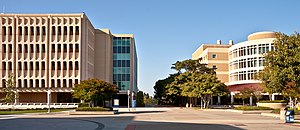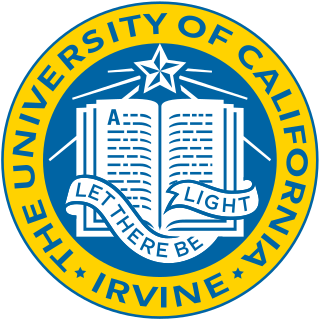
The University of California, Irvine is a public land-grant research university in Irvine, California. One of the ten campuses of the University of California system, UCI offers 87 undergraduate degrees and 129 graduate and professional degrees, and roughly 30,000 undergraduates and 6,000 graduate students were enrolled at UCI as of Fall 2019. The university is classified among "R1: Doctoral Universities – Very high research activity" and had $523.7 million in research and development expenditures in 2021. UCI became a member of the Association of American Universities in 1996.
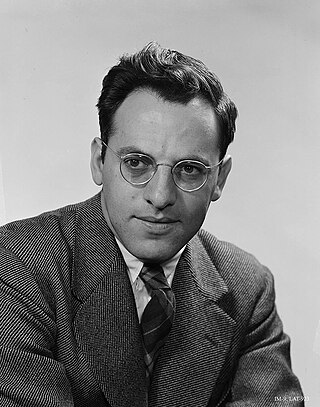
Frederick Reines was an American physicist. He was awarded the 1995 Nobel Prize in Physics for his co-detection of the neutrino with Clyde Cowan in the neutrino experiment. He may be the only scientist in history "so intimately associated with the discovery of an elementary particle and the subsequent thorough investigation of its fundamental properties."
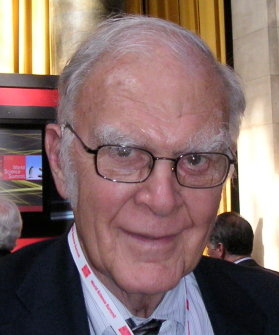
Frank Sherwood "Sherry" Rowland was an American Nobel laureate and a professor of chemistry at the University of California, Irvine. His research was on atmospheric chemistry and chemical kinetics. His best-known work was the discovery that chlorofluorocarbons contribute to ozone depletion.

Nagoya University, abbreviated to Meidai (名大) or NU, is a Japanese national research university located in Chikusa-ku, Nagoya.

Ralph John Cicerone was an American atmospheric scientist and administrator. From 1998 to 2005, he was the chancellor of the University of California, Irvine. From 2005 to 2016, he was the president of the National Academy of Sciences (NAS). He was a "renowned authority" on climate change and atmospheric chemistry, and issued an early warning about the grave potential risks of climate change.

The Faculty of Science is the largest of six faculties at McMaster University in Hamilton, Ontario, Canada. Founded in 1962, the faculty is located in the Westdale neighbourhood. It houses 6,800 undergraduate students and 600 graduate students, across 39 upper-year undergraduate programs ranging from astrophysics, biochemistry, earth and environmental sciences, to life sciences, human behaviour, kinesiology and medical and radiation sciences. Notable discoveries at McMaster University include the development of neutron spectroscopy by Bertram Brockhouse which earned him a Nobel Prize in Physics in 1994.

The College of Natural Sciences at The University of Texas at Austin offers 10 Bachelor of Arts majors, 42 Bachelor of Science majors, and 20 graduate programs to more than 11,000 undergraduates and 1,400 graduate students. The college employs over 370 faculty. Many of the programs are consistently ranked in the top ten nationally, according to U.S. News & World Report (2019), including: Analytical Chemistry (4th), Applied Math (9th), Artificial Intelligence (8th), Computer Science (10th), Computing Systems (8th), Computing Theory (7th), Cosmology/Relativity/Gravity (10th), Ecology, Evolution and Behavior (6th), Mathematics Analysis (7th), Plasma Physics (3rd), Programming Language (8th), and Topology (8th). It was established in 1883.
The Faculty of Science is one of eleven faculties at McGill University in Montréal, Québec, Canada. With roots tracing back to 1843, the Faculty currently offers several undergraduate and graduate programs ranging from Earth Sciences to Mathematics to Neuroscience.
The MIT School of Science is one of the five schools of the Massachusetts Institute of Technology, located in Cambridge, Massachusetts, United States. The School, which consolidated under the leadership of Karl Taylor Compton in 1932, is composed of 6 academic departments who grant SB, SM, and PhD or ScD degrees; as well as a number of affiliated laboratories and centers. As of 2020, the Dean of Science is Professor Nergis Mavalvala. With approximately 275 faculty members, 1100 graduate students, 700 undergraduate majors, 500 postdocs, and 400 research staff, the School is the second largest at MIT. As of 2019, 12 faculty members and 14 alumni of the School have won Nobel Prizes.
The University of California, Irvine has over fourteen academic divisions.
The Faculty of Science and Engineering (FSE) is one of the three faculties that comprise the University of Manchester in northern England. Established in October 2004, the faculty was originally called the Faculty of Engineering and Physical Sciences. It was renamed in 2016, following the abolition of the Faculty of Life Science and the incorporation of some aspects of life sciences into the departments of Chemistry and Earth and Environmental Sciences. It is organised into 2 schools and 9 departments: Chemical Engineering and Analytical Science; Chemistry; Computer Science; Earth and Environmental Sciences; Physics and Astronomy; Electrical & Electronic Engineering; Materials; Mathematics; and Mechanical, Aerospace and Civil Engineering.

The ANU College of Science is a college of the Australian National University (ANU) that delivers research and teaching in physical, life, mathematical, and environmental sciences, as well as science communication. The College is composed of the Research Schools of Astronomy & Astrophysics, Biology, Chemistry, Earth Sciences, and Physics; Fenner School of Environment and Society; Mathematical Sciences Institute; and Australian National Centre for the Public Awareness of Science.
The College of Science is a division of Korea University in Seoul, South Korea. It was established in December 1952 as the Division of Science within the College of Liberal Arts. The college offers various bachelor, master, and doctorate programs through affiliation with the Graduate School. Its major academic buildings are located on the university's Hana Square, which it shares with the College of Engineering, the College of Life Sciences and Biotechnology, and other colleges. It is widely regarded as one of the finest colleges of science in the country.
The College of Science at Virginia Tech contains academic programs in eight departments: biology, chemistry, economics, geosciences, mathematics, physics, psychology, and statistics, as well as programs in the School of Neuroscience, the Academy of Integrated Science, and founded in 2020, an Academy of Data Science. For the 2018-209 academic year, the College of Science consisted of 419 faculty members, and 4,305 students, and 600 graduate students. The college was established in July 2003 after university restructuring split the College of Arts and Sciences, established in 1963, into two distinct colleges, the other half becoming the College of Liberal Arts and Human Sciences. Lay Nam Chang served as founding dean of the College of Science from 2003 until 2016. In 2016, Sally C. Morton was named dean of the College of Science. Morton served in that role until January 2021, when she departed for Arizona State University and Ronald D. Fricker—senior associate dean and professor in the Department of Statistics—was named interim dean of the College. In February 2022, Kevin T. Pitts was named the third official dean of the College of Science.
Herbert Hwa-sen Chen was a Chinese-born American theoretical and experimental physicist at the University of California at Irvine known for his contributions in the field of neutrino detection. Chen's work on observations of elastic neutrino-electron scattering provided important experimental support for the electroweak theory of the standard model of particle physics. In 1984 Chen realized that the deuterium of heavy water could be used as a detector that would distinguish the flavors of solar neutrinos. This idea led Chen to develop plans for the Sudbury Neutrino Observatory that would eventually make fundamental measurements demonstrating that neutrinos were particles with mass.

The College of Science at the University of Utah is an academic college of the University of Utah in Salt Lake City, Utah. The college offers undergraduate and graduate degrees in atmospheric science, biology, chemistry, geology and geophysics, mathematics, metallurgical engineering, mining engineering and physics and astronomy.
The William J. and John F.Kennedy College of Sciences at the University of Massachusetts Lowell is so named for the Kennedy family and their contributions to the campus. John F. Kennedy is an alumnus of the Lowell Technological Institute Class of 1970. The Lowell Technological Institute merged with the Lowell State College to become the University of Lowell in 1972. It joined the UMass system in 1991 to become UMass Lowell.
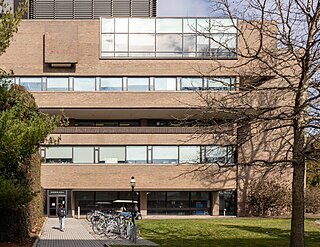
The Princeton University Department of Physics is an academic department dedicated to research and teaching at Princeton University. The associated faculty members, researchers, and students have been recognized for their research contributions, having been awarded 19 Nobel Prizes, four National Medals of Science, and two Wolf Prizes in Physics. Notable professors, researchers, and graduate students affiliated with the department include Richard Phillips Feynman, Joseph H. Taylor, Jim Peebles, Eugene P. Wigner, and John von Neumann. In addition, the department offers degree programs for bachelor's students (A.B.) and doctoral students (Ph.D.).
